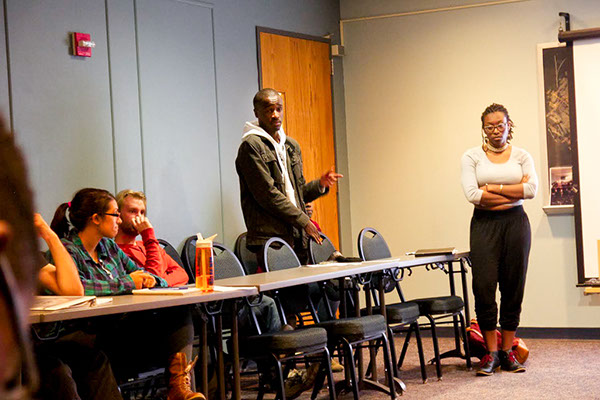
The Academic Senate met on Friday, Nov. 7 in Lecture Center 107 to discuss proposals, provisions and reforms to the Student Evaluation of Instruction (SEI) forms.
Members of the Academic Senate include faculty members as well as student representatives. President Donald Christian and Provost Philip Mauceri were in attendance as well.
Since 2011, SEIs have been conducted online through my.newpaltz.edu.
Professors are currently mandated to choose 10 individualized questions from a database of over 200 to be selected for students to answer based on their experience.
As a part of the evaluation, students must submit two parts. The first half is 12 questions, where students numerically rate the professor on a scale of one to 10. The second half is “Question 13” in which students submit their open-ended comments to the professor.
As it currently stands, each semester, professors have the option to opt-in or opt-out to grant permission for the open-ended comments to be sent to higher authoritative powers such as the department chair, the dean, the reappointment, promotion and tenure committee, Mauceri and Christian.
The current provision states “explicit faculty permission is required for release of the SEIs student written comments to third-parties.”
As a result of the conversion to the online format, faculty lost the option of choosing whether or not they wanted to release the open-ended comments received from Question 13. The comments would no longer be released without the explicit permission from the individual faculty member had the provision not been reformed.
With the new provision, faculty will have a checkbox provided to individually authorize release of these comments to other parties, which will include the department chair, the dean, the reappointment, promotion and tenure committee, Provost and the President.
In addition to faculty, students will have the ability to check a box to authorize release of their written open-ended comments to other parties aside from individual faculty.
The default on the SEI survey will be an unchecked box. Faculty authorization will only be granted by checking the box. The faculty authorization rule does not pertain to Freedom of Information Law requests.
Christian said a concern and goal of the SEIs is “protecting good teachers from negative narrative assessment.”
Another concern of the SEI proposals is protecting faculty from comments about physical attributes and personal attacks. Several professors in attendance expressed their experiences with receiving these types of comments through Question 13.
“The other thing that I think a number of female professors expressed, is that there is empirical evidence that women receive more negative comments than men,” Janice Anderson, president officer of faculty and associate professor said. “That’s something that most men wouldn’t recognize is that women consist to receive more negative comments. When you read SEIs, there are going to be extremes on both ends. Many of the best innovations I’ve done in my teaching have come from the SEIs. Yeah, you need a tough skin. Those kinds of comments resonate with you for years.”
Jordan Taylor, vice president of academic affairs and governance said he would like to see student participation and an increase in the effectiveness and efficiency of teaching with SEIs that are sensitive to faculty members.
“[Faculty] are human beings, too,” he said. “Students go overboard sometimes. I would like to see a balance between student concerns and faculty comfort in the process.”
Throughout the discussion, there was a variety of opinions stated by Christian, the Provost and faculty members.
Zach Grossman of the Academic Affairs Committee (AAC) said he was content with where the recommendations came from. He said it has been a long year to year and a half working on the proposals.
“It’s been very tiring, but I’m very happy that I was able to see it move up the ladder,” he said. “One point was brought up, so we will discuss it in Academic Affairs Committee and see what we can do. As of now, I’m happy where I am with our recommendations and our proposals.”
Mauceri said Christian and himself have agreed to the suggested recommendations and revisions that the AAC have put forward.
“We look forward to working with the Academic Affairs Committee in developing new ways to qualitatively assess the area of teaching,” he said.
The meeting was adjourned before a vote was conducted. The vote to pass the proposals and revisions will be delayed until the next Academic Senate meeting on Friday, Dec. 5. If the vote is passed, it will appear on the agenda for the next faculty meeting on Wednesday, Dec. 10 from 1 to 3 p.m.
